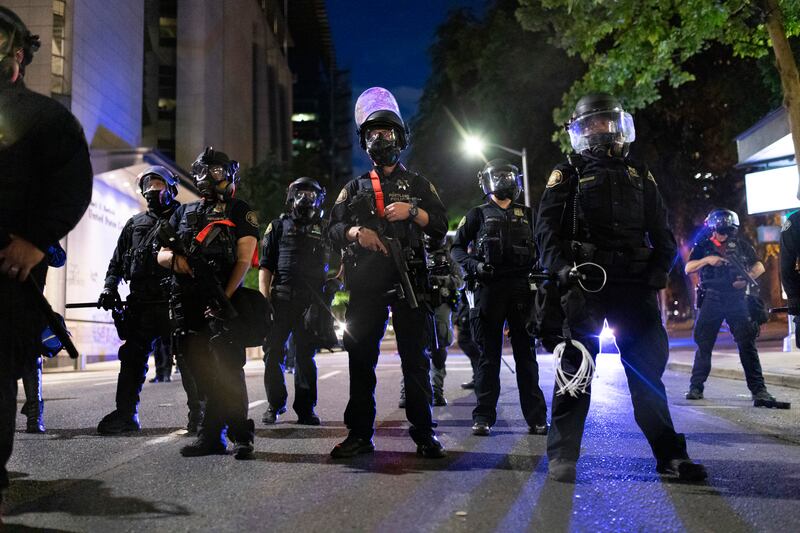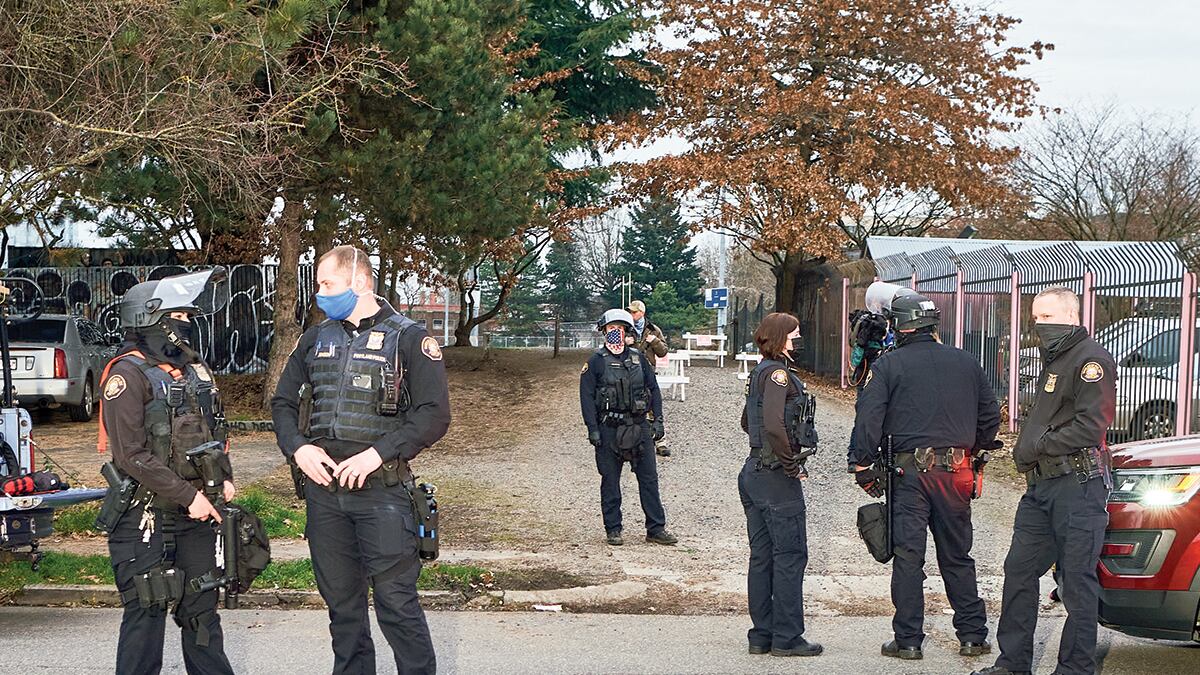City government moves notoriously slowly. And the process of equipping Portland Police Bureau officers with body cameras? Absolutely glacial.
For nearly a decade, city leaders have debated—with the public and among themselves—whether to equip Portland’s 788-member police force with recording devices strapped to their chests.
That paralysis has left Portland an outlier: PPB is the only police department among the 75 largest municipal law enforcement agencies in the country that doesn’t use the devices, according to KGW-TV.
Once again, City Hall is now poised to set aside money for the cameras before the year is up. This time, Portland is being prodded into action by a greater authority: the U.S. Department of Justice.
“As one of the last major cities whose police force is operating without this tool and heading toward a historically high homicide [rate], this conversation is past due,” says City Commissioner Mingus Mapps. “Fortunately, with both the DOJ and the [police union] pushing for a program, it’s all but certain that the city will fund a body-worn camera program this year.”
And body cameras have won over the support of a longtime skeptic: Commissioner Jo Ann Hardesty. “I’m confident that through good faith bargaining and working with the Department of Justice we will land in a good place,” she says.
Despite the optimism, unanswered questions that were once major sticking points in previous attempts to implement body cameras remain unresolved. Among the most pressing is the concept of “pre-review”—whether cops should be allowed to review body camera footage prior to writing police reports.
“It’s such a dangerous proposition. It’s a cop that won’t blink,” says Juan Chavez, a lawyer with the Oregon Justice Resource Center. “This is a future that we all should be cautious about.”
Nevertheless, the Portland City Council appears poised to vote now and iron out the details later.
“We don’t need to have every detail set,” Mapps says. “That said, it will benefit the process to agree on some of the critical aspects of the program, such as our policy around the review of body-worn camera video footage. Many of these policy decisions have cost implications for the technology.”

The Biden Justice Department has a say in Portland body cameras because, nearly a decade ago, the DOJ found a “pattern and practice” of the Portland Police Bureau using excessive force against people with mental illness. Portland signed a settlement—and earlier this year, the city was found to be out of compliance.
So now the parties are meeting behind closed doors for mediation sessions before U.S. District Judge Michael Simon, who has been assigned to the case since the start. They’ve held two sessions so far, most recently on Oct. 6.
Among the proposed remedies for the Police Bureau’s failures to reform itself: body cameras.
Mayor Ted Wheeler is ready to comply.
“The mayor is working to get body-worn cameras on Portland police officers as soon as possible,” spokesman Rich Chatman confirms to WW. “He recognizes that this equipment is important for the city of Portland to have a police force that is accountable and transparent.”
Chatman says Wheeler is “going to be moving forward with the procurement process” so that funding for body cameras will be included in the fall budget monitoring process. The estimated price: $2.6 million, which does not include implementation costs, Chatman says.
That will be a popular proposal: Polling figures released this week by a business-backed group show 96% of Portland voters want police to wear body cameras.
“I know the police have wanted them for a long time. It’s been pennywise, pound-foolish City Councils of the past that did not fund this,” says Bob Ball, a retired reserve commander who spent more than 22 years in the Portland Police Bureau.
The funding for body cameras, meanwhile, sat in city coffers for years. Then the COVID-19 pandemic hit—and Portland eliminated the nearly $835,000 set aside for the program.
“It’s clear to an overwhelming majority of Portlanders and all of council at this point that body-worn cameras are a critical tool for both police accountability and community safety,” Mapps says. “My interest is in getting these cameras available for officers and benefiting the community as soon as possible. Council will resolve our differences and propose a reasonable policy that meets the Police Bureau’s and the city’s needs.”
But there is still potential for delays and roadblocks.
If the city and DOJ can’t reach agreement during mediation with the police union, which is an “intervenor” in the case, it’s possible the case will be appealed. The appeal process could drag out the implementation of body cameras for months or years.
And the court-approved advisers in the case, called “amici curiae,” or friends of the court, represent some of the city’s most outspoken skeptics of body cameras, including the Mental Health Alliance and the Albina Ministerial Alliance’s Coalition for Justice and Police Reform.
Reasons to be cautious include privacy—who maintains the footage and how the surveillance tool will be used—and access: In which circumstances will the press and the public get to review footage? How long will they have to wait to see it?
According to Chavez, who represents the Mental Health Alliance in the DOJ case, a key constitutional issue is the concept of pre-review. Critics of body cameras argue pre-review will allow an officer the benefit of hindsight to justify their actions. For example, if an officer reviews body camera footage and notices after the fact that a suspect was armed or had a broken taillight, they could then use those factors as justification for a traffic stop or use of force even though the officer wasn’t aware of them in the moment.
“Pre-review is one of the big existential, constitutional questions that needs to be hashed out now,” Chavez says. “We need to prevent the police from being able to come up with these post hoc justifications.”
That’s also a major factor that deadlocked the approval of body cameras in 2016. But some see it as a benefit to the community at large.
“I land on the side of giving the officers the benefit of the doubt,” Ball says. “I think any tool that an officer has that can help them write the best report about what actually happened, we should support that.”
As WW first reported in May, the Portland Police Association proposed implementing body cameras in its union contract with the city.
That puts Portland in an odd position: It’s police who want body cameras and advocates of police reform who aren’t convinced. But the union’s drafted proposal shows why the minutiae of body camera policies raise questions about whether the devices will help or harm community members, particularly those most vulnerable to negative interactions with police.
The union’s proposal, for example, said PPB officers would be allowed to pre-review footage from their own body cameras, as well as recordings from other body cameras that “capture the officer’s image and voice” before writing reports or testifying “in any forum.” The proposal also stipulated the city would need to hand over the footage within 24 hours of the union’s request—an Amazon Prime-like speed considering the molasses pace of Portland bureaucracy.
It’s not clear how much of that proposal the police union, or PPB, for that matter, actually expects to be enshrined in policy. (The Portland Police Association did not respond to WW’s request for comment.)
Because it’s a subject of mediation between the city and the DOJ, as well as between the city and the PPA, which have been in mediation since July over the cops’ collective bargaining agreement, city officials have remained tight-lipped about their opinions on body cameras since May.
That means that if something goes wrong with the camera proposal this time, the public might not know quickly. In a glaring irony, the decision-making process is currently happening behind closed doors.
“The details are currently reserved for the bargaining table as the city of Portland remains in negotiations with PPA,” Hardesty says. “With advancements in body camera technology, policies, and additional best practices to draw from, I now believe we can develop a body camera program that contributes to accountability, transparency, and better outcomes in policing.”
Update: The story has been updated to include the estimated cost for purchasing body cameras.
